Thursday, June 30, 1966
Tokyo
Concert • By The Beatles • Part of the 1966 Japan and Philippines Tour
Last updated on December 22, 2023
Thursday, June 30, 1966
Concert • By The Beatles • Part of the 1966 Japan and Philippines Tour
Last updated on December 22, 2023
Location: Nippon Budokan
Previous concert Jun 26, 1966 • Germany • Hamburg • 7pm show
Interview Jun 29, 1966 • The Beatles interview for NTV Channel 4
Concert Jun 30, 1966 • Japan • Tokyo
Concert Jul 01, 1966 • Japan • Tokyo • 2pm show
The Beatles create an abstract collaborating painting during their stay in Tokyo
June 30 - July 2, 1966
On the morning of June 28, 1966, after an unscheduled nine-hour stop in Anchorage (travelling from Hamburg), The Beatles continued their journey to Tokyo and landed at Tokyo’s Haneda Airport at 3:40 am on June 29.
On the afternoon of June 29, The Beatles gave a press conference at the Hilton Hotel and were also interviewed buy NTV Channel 4.
On this day, June 30, they played the first of five concerts at the Nippon Budokan Hall. The primary purpose of this hall was to host martial arts contests. The Beatles being the first rock group to perform there, their appearances were met with opposition from those who felt the appearance of a western pop group would defile the martial arts arena.
From Wikipedia:
[…] The band played the first of their five concerts at the Budokan on 30 June. The support acts were all local artists: the Drifters, Yuya Uchida, Isao Bitoh, the Blue Comets, Hiroshi Mochizuki, and the Blue Jeans. The shows were sponsored by the Japanese newspaper Yomiuri Shimbun and promoted by the Kyodo Agency. Both the 30 June performance, when the Beatles were dressed in dark green suits with red shirts, and the first show on 1 July, when they wore Hung On You-designed grey suits with thin orange stripes, were filmed in colour by Nippon TV. The footage was swiftly edited by the television company and combined with brief segments of documentary footage for broadcast, as The Beatles Recital: From Nippon Budokan, Tokyo, at 9 pm on 1 July.
“In sober truth, no recent event connected with the UK – apart from the sole exception of the British Exhibition of 1965 – has made a comparable impact on Tokyo … Most commentators accepted them for what indeed they are – agreeable, talented and quick-witted young musicians.” – Michael Stewart, Britain’s ambassador to Tokyo, reporting on the Beatles’ visit
As ultranationalist students demonstrated in the city and outside the venue, the police presence was especially heavy inside and around the stage. According to Tony Barrow, the police feared that these right-wing students might have placed snipers in the audience. The stage itself was set on an 8-foot-high podium; all ground-floor seating had been cleared, meaning the audience was restricted to the hall’s first and second tiers. Concertgoers were warned that anyone standing up or cheering risked being arrested. The Beatles felt that the uniformed officers subdued the crowd, although the Japanese fans’ more reserved nature, relative to the group’s usual audiences, was also a factor. The band gave an especially poor performance on 30 June. According to Barrow and Aspinall, the group were humbled by this, having grown accustomed to not hearing themselves play, and resolved to perform well for the remainder of the Budokan dates. […]
After this first concert, they returned to the Hilton Hotel. John went to bed, while Paul, George and Ringo went to the bathhouse of the hotel to enjoy a typical Japanese massage bathing.
I felt great afterwards but the massage hurts sometimes. I was waiting for the knee-in-your-back bit and it came. When the girl pressed her thumbs into the back of my neck, it was like pushing stuffing into a broken teddy bear.”
Paul McCartney – From “The Beatles: Off the Record” by Keith Badman, 2008
The Beatles played four other concerts at the Budokan, two on July 1 and two on July 2.
Throughout their stay at The Tokyo Hilton from June 30 to July 2, The Beatles welcomed a variety of visitors — journalists, merchants, and others — in their suite. They also had enough time to create a collaborative abstract painting.
Racing off after their first show, The Beatles knew they had not been on top form. As they towelled away the sweat from their faces in the privacy of the dressing room, George was the first to admit the truth: “That was the worst performance of ‘If I Needed Someone’ I’ve ever done!” Ringo shrugged his shoulders and replied with something like: “There are good nights and bad nights on all tours.” The others put it down to jet lag, particularly the nine hours added on to our journey by the Anchorage stopover. George was the most candid: “Let’s face it, this is as good as it gets for us nowadays on tour. We’re burning ourselves out on these pointless stage shows when there are better things we could be doing in the recording studios.” They were putting into words what we had all been thinking for some time. The Beatles needed to cut down on concerts and spend much more time at EMI’s Abbey Road complex in St John’s Wood. In a matter of weeks the others would admit that they agreed with George and the touring era would come to an end.
Tony Barrow – From “John, Paul, George, Ringo & me: the real Beatles story“, 2006
They had the seating exactly arranged in all the cars. Amazing efficiency, that we’d never seen the like of in Britain. When we went to the gig they had the fans organised with police patrols on each corner, so there weren’t any fans haphazardly waving along the streets. They had been gathered up and herded into a place where they were allowed to wave, so we’d go along the street and there’d be a little ‘eeeeek!’ and then we’d go a few more hundred yards and there’d be another ‘eeeeek!’
At the Budokan we were shown the old Samurai warriors’ costumes, which we marvelled at dutifully in a touristy kind of way: ‘Very good! Very old!’
We were more amazed to see the women leaping up out of the seats for the promoter, because we’d never seen that in the West. The subservience of the women was amazing. They’d say, ‘Oh God, I’m sorry – was I in your seat?’ I remember us getting back to Britain and saying to our wives and girlfriends, ‘I wouldn’t want you to do that, but maybe it’s a direction worth considering?’ Promptly rejected.
We got into our yellow shirts and natty bottle green suits. The thing about suits was that they always made us feel part of a team. When we arrived we were in our civvies, but once we put those on we were The Beatles! – the four-headed monster. It was good for me that we all wore the same, in that I really felt part of a unit.
Peeping from behind the stage to watch the place fill up, we saw police walk in from either side and fill the whole of the front row, upstairs and downstairs. After them, the crowd was allowed to come in. They were very well behaved compared to what we’d seen of Western crowds, but they seemed to enjoy it.
There was a funny local group on stage before us. This was in the days when the Japanese didn’t really know how to do rock’n’roll, although they’ve now got the hang of it pretty well. They sang a song that went, ‘Hello Beatles! Welcome Beatles!’ – something pretty naff in rock’n’roll terms, but it was very nice of them to do it. Our show went down quite well.
Paul McCartney – From “The Beatles Anthology” book, 2000
The audience were reserved, but they were up on their feet – or they tried to be, but there were police all around the stadium with cameras with telephoto lenses, and anybody who stood up and looked like they were going to run toward the stage was photographed. The people were very restricted as to what they could do and how they could respond to us. It was a warm reception – but a bit clinical, as Japan is.
George Harrison – From “The Beatles Anthology” book, 2000
George’s version of what the security people got up to in the Budokan was blissfully naïve, to say the least… Those guys were hoping to spot potential snipers in the audience and if they had done so the cameras could have been exchanged for firearms in a split second. At the same time Paul told the Anthology how efficiently the guards along our two-mile route from the Tokyo Hilton to the Budokan collected up the fans and grouped them neatly at street corners and on bridges rather than letting them wander around haphazardly. The truth is that the authorities feared the studios might have placed terrorist gunmen along the route and by herding the fans into well-contained little groups they were clearing their own field of fire and reducing the risk of stray bullets hitting fans.
Tony Barrow – From The Beatles Bible
Paul McCartney played the Budokan again in 2015 as part of his “Out There” tour and in 2017 as part of his “One On One” tour.
What was the most memorable thing about playing the Budokan concert [with The Beatles] and why did you decide to return to the venue [in 2015]?
The most memorable thing about the concert was the fans, who were sensational. But what struck us as being just as memorable were the security arrangements that were put in place. The whole front row of the balcony was police, and we saw them all walking in. And as we were going to the show, all the fans were corralled on each street corner and guarded by police. So as we went by they went, ‘Eeeeeeehh!!’ And then there’s nothing for the next block or two. And then ‘Eeeeeeehhh!!’ It was zany because we’d come from England and the US where it had been mayhem. So when I think of the Budokan show I think of the fans first, and then security second.
Why go back and play there again? Just because it was such a special venue to play and I have a particularly special feeling about it. So when someone said there was a possibility of playing there again I jumped at the chance for old times’ sake.”
Paul McCartney – From paulmccartney.com, March 28, 2015
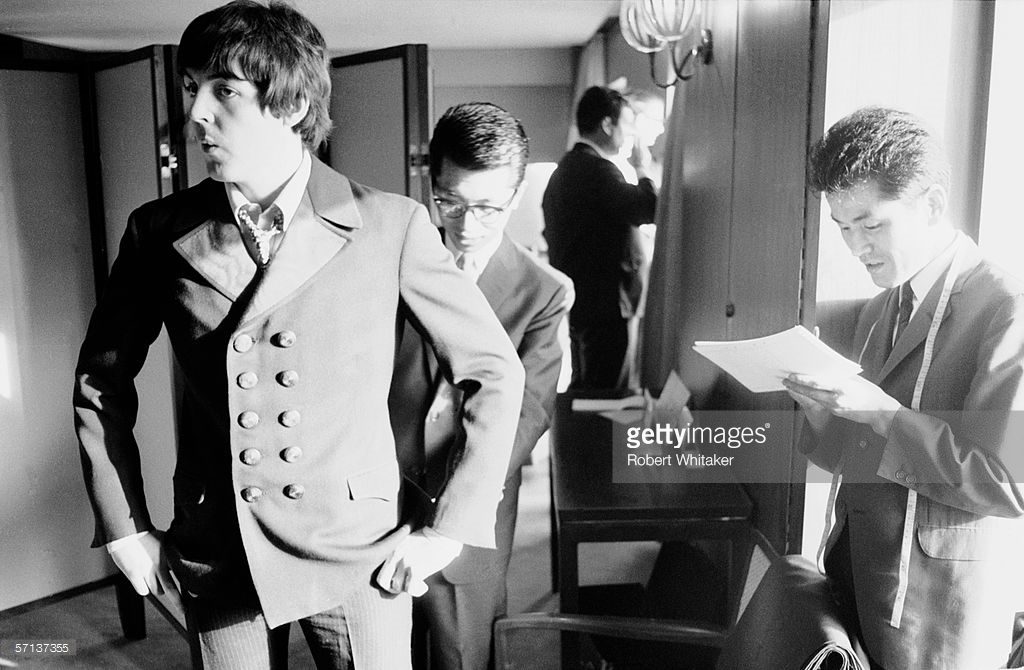
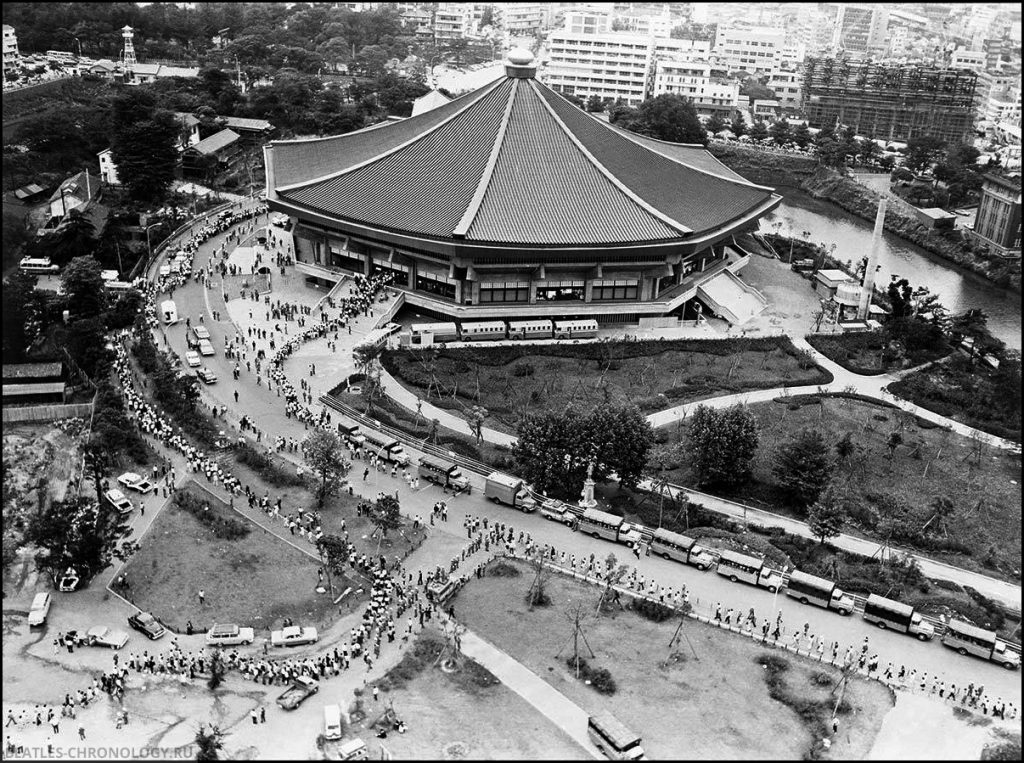
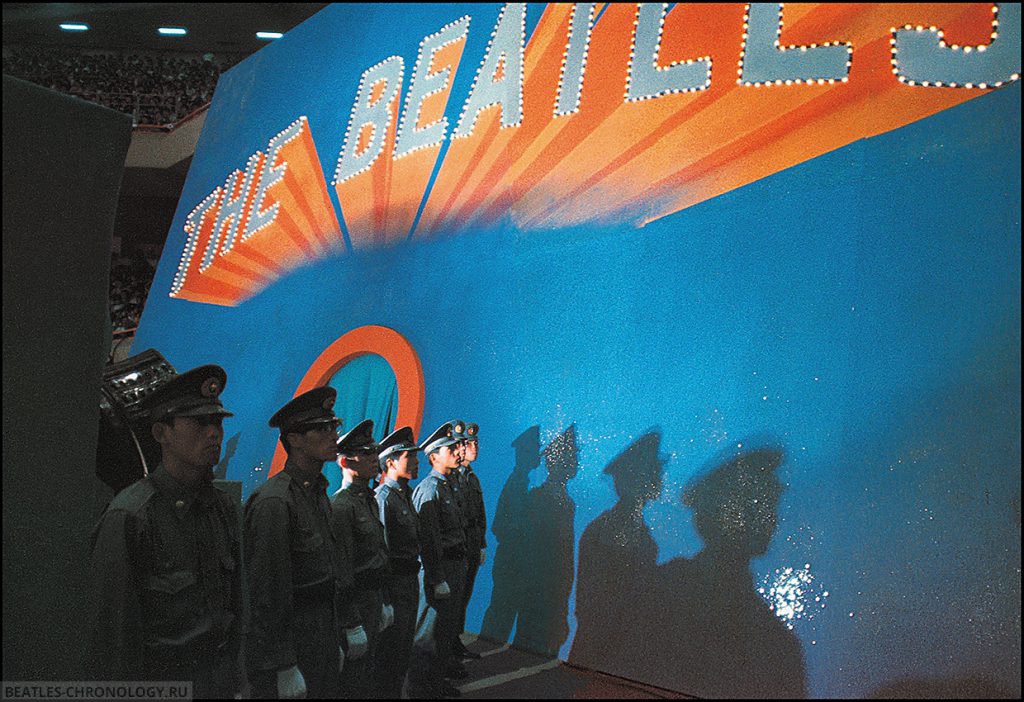
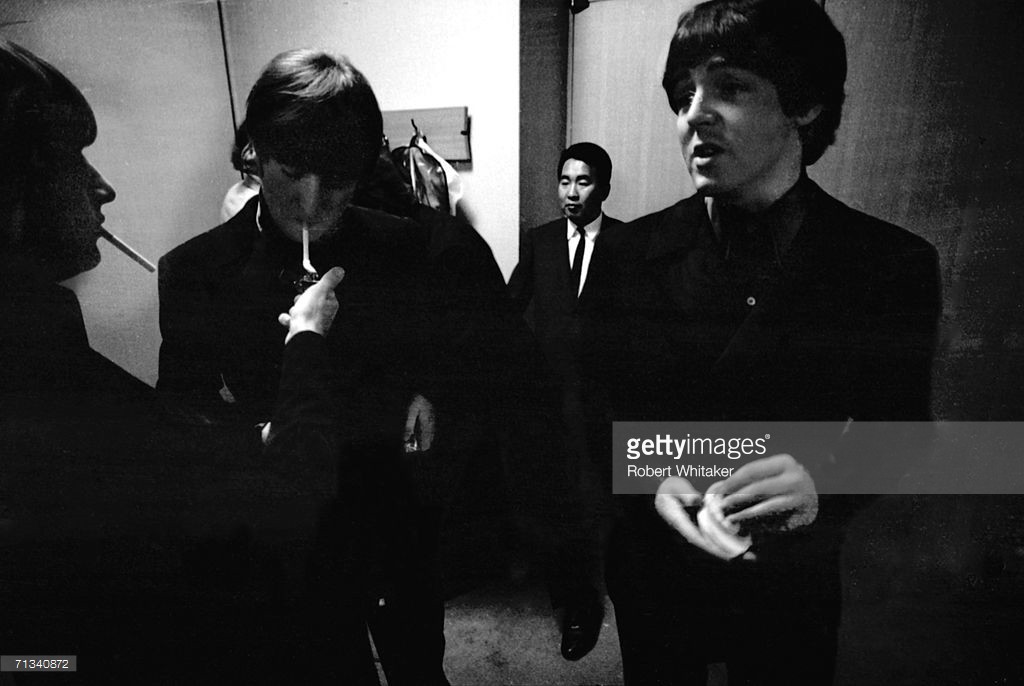
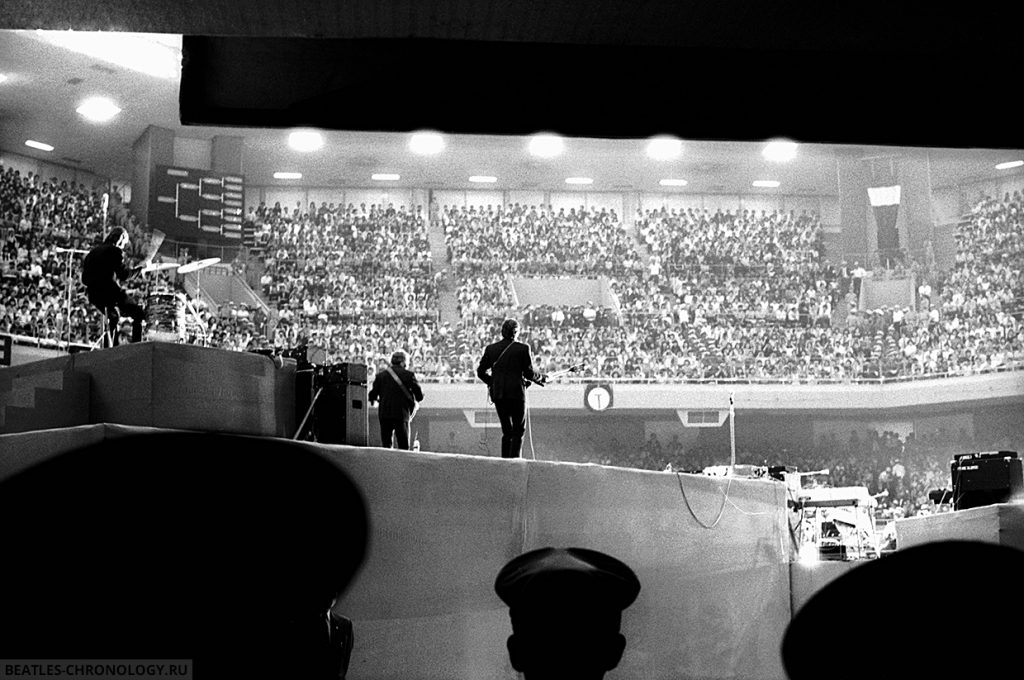
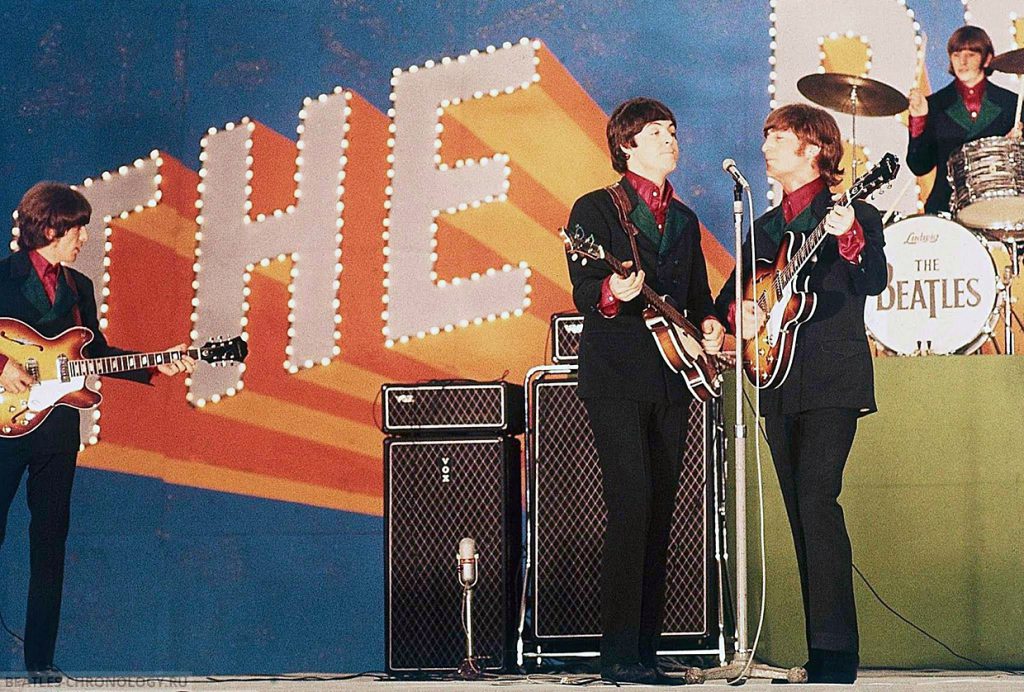
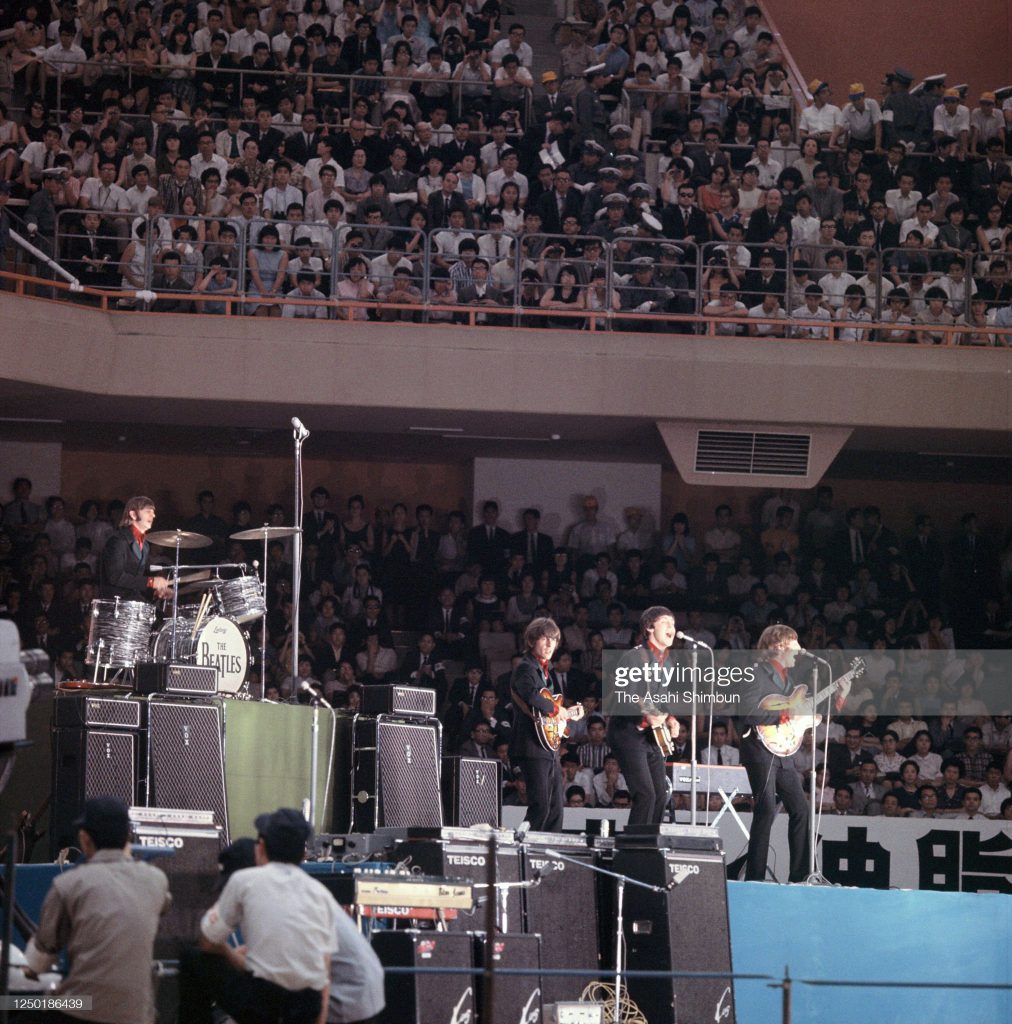
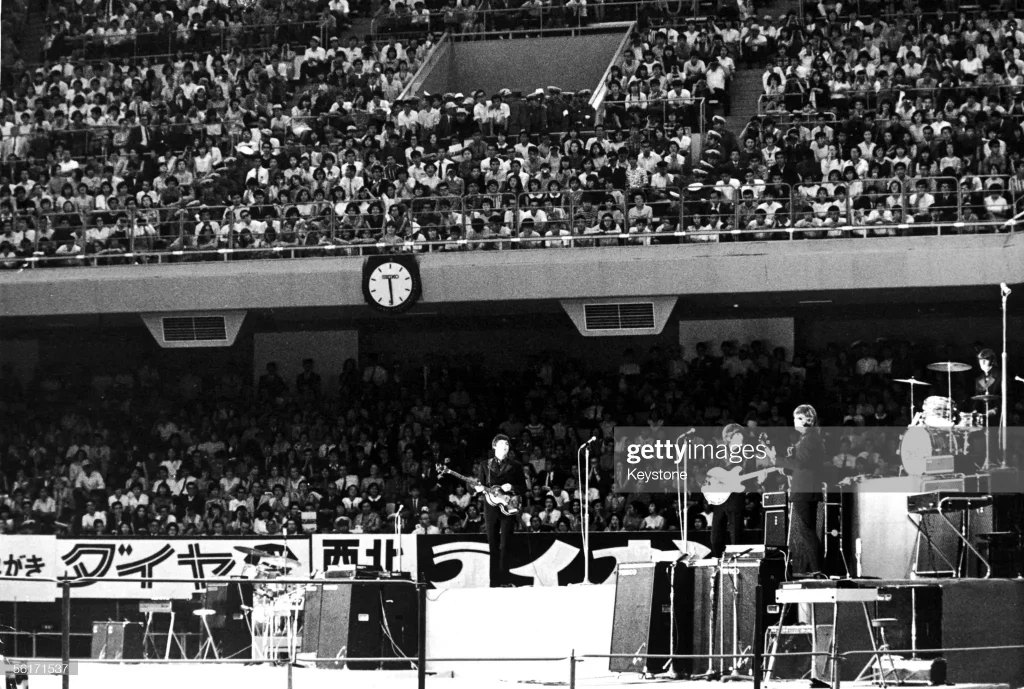
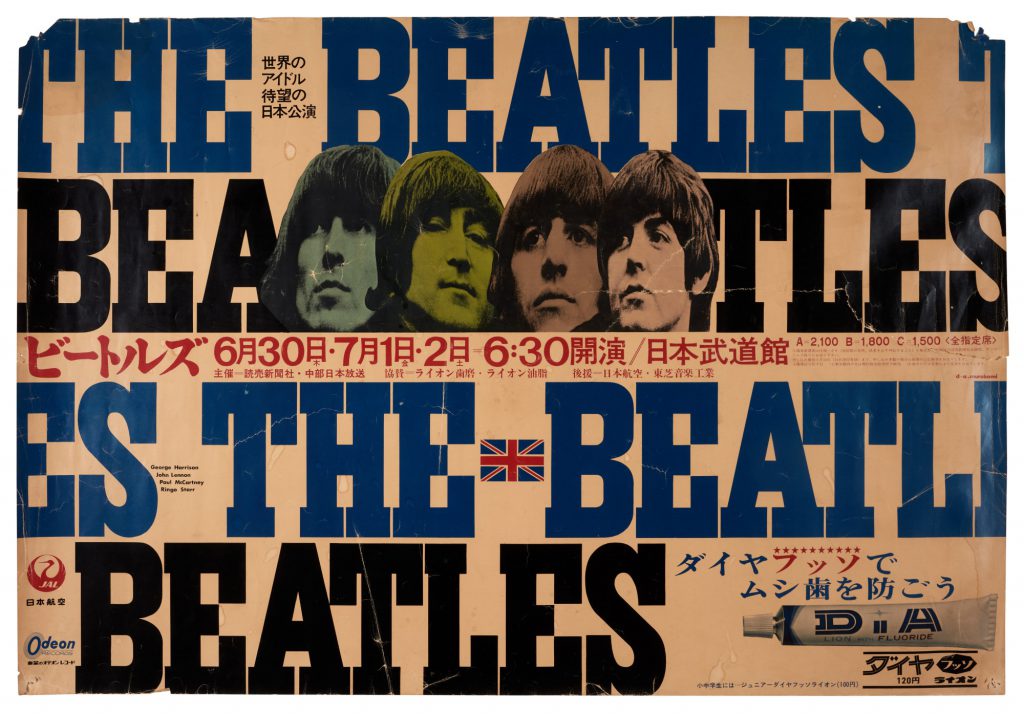
From The Japan Times:
The Beatles played at the Nippon Budokan arena in Tokyo on June 30, July 1 (2 p.m. and 6:30 p.m.) and July 2 (2 p.m. and 6:30 p.m.) as part of a world tour. About 43,000 people saw the band perform in Japan.
Their visit can be seen as part of Japan’s postwar re-emergence on the world stage, starting with the 1964 Tokyo Olympics and culminating with Expo ’70 in Osaka.
The Fab Four inspired a generation of Japanese rock ‘n’ rollers.
“The Beatles’ shows in Japan were a social phenomenon,” Tanaka says. “They led to the birth of a real Japanese rock music scene, where the musicians not only performed songs by somebody else, but also wrote their own material.”
Beatles expert Atsushi Noguchi says British musician Vic Lewis suggested the idea of a Japan tour to the band’s manager, Brian Epstein. Lewis had gone to school in London with Tatsuji Nagashima, who later became president of concert promoter Kyodo Agency (which produced the Beatles’ shows in Tokyo).
Noguchi says Epstein wanted a guarantee of $100,000 (worth around $750,000 in 2016, or ¥78 million) per show and a hall with a capacity of 10,000. Back in 1966, there was only one indoor venue in Tokyo that could accommodate that many people: the Budokan. It had been built for martial arts competitions, not pop music. Ultranationalists were outraged by the prospect of its desecration by “an electric-guitar concert,” as Cheke put it in his missive to the mandarins of Whitehall.
The extreme left also took issue with the Beatles. Cheke noted that Akahata, the Japanese Communist Party’s daily newspaper, labeled the band as “tools of American (sic) imperialism.” The ideologues of Akahata may well have revised their anti-Beatles line after Lennon told a press conference on June 30 that the group opposed the war in Vietnam.
Cheke noted that the Japanese media for the most part accepted the Beatles for what they were: “agreeable, talented and quick-witted young musicians.”
Despite that, for a time it seemed local right-wing nut cases were going to succeed in intimidating the Budokan into canceling the Beatles’ shows. However, as Cheke noted, the Yomiuri Shimbun (one of the sponsors of the Fab Four’s concerts in Japan) “published a letter from the chairman of the board of the Budokan saying that ‘the respectability of the Beatles was beyond any doubt, the proof being that they had all received decorations from Her Majesty the Queen.’“
That didn’t prevent the ultranationalists from mounting protests against them. Cheke noted that while the group was in Tokyo, the Beatles “had to be protected from fan and foe alike” in what the police dubbed “Operation Beatles.“
Cheke wrote that the security “was of almost the same magnitude as the arrangements for the Tokyo Olympic Games in 1964.” He noted that some 35,000 policemen were mobilized, at an estimated cost of £30,000 (worth around ¥58 million).
The heavy security cordon around the band meant that John, Paul, George and Ringo were virtual prisoners in the Tokyo Hilton (later the Capitol Tokyu Hotel) during their stay.
During the press conference at the hotel, a reporter asked the Beatles how they felt about that. McCartney’s reply was typically diplomatic.
“If the security is strict, then it is probably best for us and the people as well,” McCartney said. “Sometimes it’s too strict, but the best situation is when it’s just strict enough so that nobody gets hurt.“
McCartney was also on form when asked what he thought about people who said that by playing at the Budokan the Beatles were setting a bad example for Japanese youth and leading them astray from traditional values.
“The thing is that if somebody from Japan … if a dancing troupe from Japan goes to Britain, nobody tries to say in Britain that they’re violating the traditional laws, you know, or that they’re trying to spoil anything,” McCartney said. “All we’re doing is coming here and singing because we’ve been asked to.“
Lennon followed this up more succinctly — and acerbically: “Better to watch singing than wrestling, anyway.” […]
[…] The first Budo-Kan show was at 6:30 p.m. last Thursday. There were amazing sights in the CadilIac convoy as literally thousands of police lined the route from the hotel to the venue, opening up the way through rush-hour traffic.
Similar treatment was accorded only an Emperor plus visiting royalty. No American motorcade ever matched the fantastic organisation of this. All stages of the drive were reported to mobile HQ via radio.
Later, on the return trip, Iining police waved Japanese lanterns indicating the route. At the venue, there were 2.500 police, many wearing crash helmets. Japanese green tea was served to the Beatles in typically polite style in the most beautiful dressing room accommodation ever seen on tour.
The Budo-Kan has three-tier seating but the ground level was kept entirely clear for high stage TV cameras on own railtracks, plus huge arc lamps so bright that John had his eyes closed mostly during the first number.
By Western standards, the audience was less wild than usual but very appreciative. The mere presence of so many police may have subdued more rowdy fans, but there was much handkerchief waving plus continuous screaming. Immediately afterwards at the Hilton Hotel John retired to bed. George. Paul and Ringo went to the hotel basement bathhouse to sample typical Japanese massage bathing. […]
From Disc And Music Echo – July 9, 1966
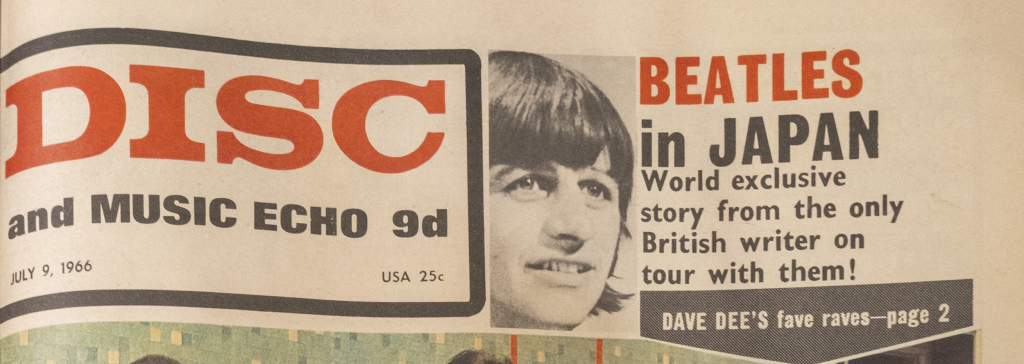
beatle life
Last year, The Beatles went to Tokyo where their visit was organised with fantastic Japanese precision. Neil Aspinall, their Road Manager, writes his account of the trip.
OUR journey from Hamburg to Tokyo took more than thirty hours — including an unscheduled stopover (which I told you about a few weeks back) in Anchorage, Alaska. We were detained there while our Japan Airlines pilot waited for a weather report announcing the subsidence of Typhoon Kit, a raging 135 m.p.h. storm which was passing over the Far East and preventing our flight into Tokyo.
If the Japanese set out to do a job, they like to do it well. Our entire stay in Tokyo was organized so thoroughly that everything was planned to the last detail. Once we were installed in the huge Presidential Suite on the tenth floor of the Tokyo Hilton, the concert promoter distributed itinerary leaflets which listed each scheduled movement with typical Japanese precision:
3.27 p.m. Beatles will leave Presidential Suite.
3.28 p.m. Beatles will enter elevator.
3.29 p.m. Beatles leave elevator in basement garage and enter Cadillacs.
3.30 p.m. Convoy will depart for Budo Kan.“Amazing, isn’t it,” said George as he read through the intricately detailed lists of times. “If I stop to blow my nose before we get in the lift the whole day will be thrown out of gear!“
At the Budo Kan somebody had even taken the trouble to pace out the walk from an upstairs dressing room to the back of the stage — timing it with stopwatch perfection at forty-five seconds. Thus a backstage helper would knock on the door exactly sixty seconds before the boys were due on stage. He was allowing fifteen seconds for John, Paul, George and Ringo to get up out of their chairs and join him at the dressing-room door.
Of course, all this devotion to organizational detail had its drawbacks when The Beatles wanted to deviate from the laid down schedule and take a sightseeing trip around the city.
“We don’t need a police escort or anything,” insisted John. “Just tell them we’ll slip out quietly in a couple of cars.“
“They say that would be dangerous,” I told the boys. “Apparently if you are spotted in a busy part of town there’ll be a mob round in a moment.” “Dangerous?” said Ringo. “What’s dangerous about a crowd of fans? We don’t mind meeting a few fans. Anyway, we want to see something of Tokyo while we’re here.” The others agreed, but the police chiefs stood firm on the point and said that unofficial excursions should not be made.“What time’s the first show?” asked George. “We’ve to leave the Hilton at 6.30 p.m.,” I replied. “O.K., I’ll see you later,” said George casually. “Coming John?“
The rest of us didn’t see George or John until around four that afternoon — an hour later in fact. When they did return they had long faces.
“What’s up?” asked Ringo. “You managed to sneak out, didn’t you?“
“Yes, what have you bought?” joined in Paul.
“We didn’t make it,” said John sadly.
“We were caught before we even got into the lift,” went on George.
From Fabulous 208 – March 4, 1967

This was the 1st concert played at Nippon Budokan.
A total of 8 concerts have been played there • 1966 • Jun 30th • Jul 1st (2pm show) • Jul 1st (6:30pm show) • Jul 2nd (2pm show) • Jul 2nd (6:30pm show) • 2015 • Apr 28th • 2017 • Apr 24th • Apr 25th
Written by Chuck Berry
Album Available on Anthology 2
Album Available on Anthology 2 (2016 remaster)
Album Available on The Ultimate Live Collection Vol. 19
Album Available on Anthology 2
Album Available on Anthology 2 (2016 remaster)
Album Available on The Ultimate Live Collection Vol. 19
Written by George Harrison
Album Available on The Ultimate Live Collection Vol. 19
Album Available on The Ultimate Live Collection Vol. 19
Album Available on The Ultimate Live Collection Vol. 19
Album Available on The Ultimate Live Collection Vol. 19
If we modestly consider the Paul McCartney Project to be the premier online resource for all things Paul McCartney, it is undeniable that The Beatles Bible stands as the definitive online site dedicated to the Beatles. While there is some overlap in content between the two sites, they differ significantly in their approach.

Notice any inaccuracies on this page? Have additional insights or ideas for new content? Or just want to share your thoughts? We value your feedback! Please use the form below to get in touch with us.